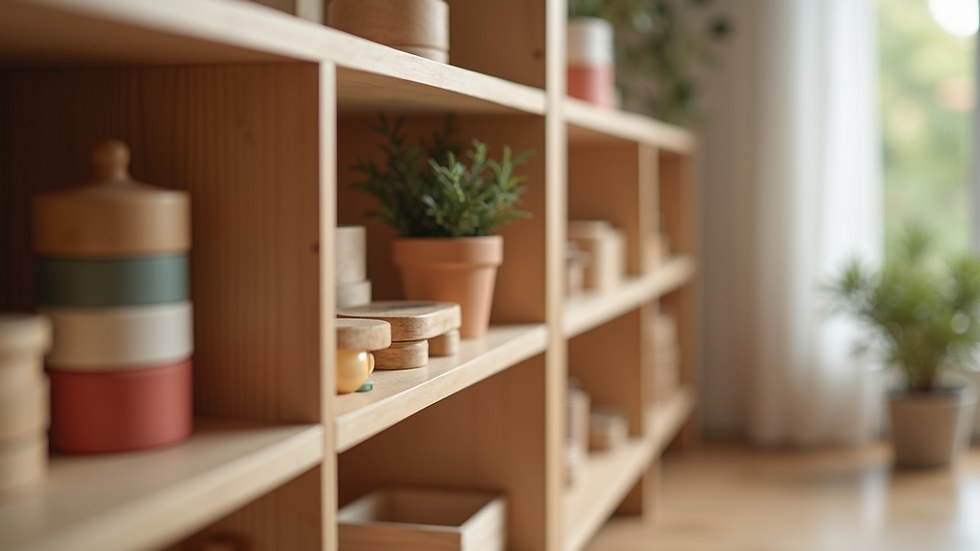Top Early Childhood Education Programs for Your Child
- Priyam
- Sep 2, 2025
- 4 min read
Choosing the right early education for your little one is a big decision. You want a place that nurtures curiosity, builds confidence, and prepares your child for a bright future. I’ve explored many options and found that quality early childhood education programs can make a huge difference. They offer more than just care - they lay the foundation for lifelong learning and success.
When you invest in your child’s early years, you’re giving them tools to thrive socially, emotionally, and academically. Let’s dive into what makes these programs stand out and how they can benefit your child.
Why Child Education Benefits Matter in Early Learning
Early childhood is a critical time for brain development. The experiences your child has now shape how they think, learn, and interact with the world. That’s why child education benefits go beyond reading and counting. They include:
Social skills: Learning to share, cooperate, and communicate.
Emotional growth: Understanding feelings and building resilience.
Cognitive development: Problem-solving, creativity, and critical thinking.
Physical coordination: Fine and gross motor skills through play and activities.
Programs that focus on these areas help children develop a love for learning. They also prepare kids for the structure and expectations of elementary school. When you choose a program with a strong curriculum and caring teachers, you’re setting your child up for success.

What to Look for in Top Early Childhood Education Programs
Not all programs are created equal. Here are some key features to consider when selecting the best fit for your child:
1. Curriculum and Teaching Approach
Look for programs that use proven methods like Montessori, Reggio Emilia, or play-based learning. These approaches encourage exploration and respect each child’s pace. For example, Montessori classrooms offer hands-on materials that promote independence and focus.
2. Qualified and Caring Staff
Teachers should be trained in early childhood education and passionate about working with young children. Warm, attentive adults create a safe space where kids feel valued and motivated.
3. Small Class Sizes
Smaller groups mean more individual attention. Your child can receive personalized support and build stronger relationships with peers and teachers.
4. Safe and Stimulating Environment
The physical space should be clean, secure, and filled with age-appropriate toys and learning materials. Outdoor play areas are a big plus for physical activity and fresh air.
5. Family Involvement
Programs that encourage parent participation and communication help you stay connected to your child’s progress and daily experiences.
If you want to explore a program that embodies these qualities, check out early childhood education programs that focus on nurturing the whole child.

How Long Does It Take to Complete Early Childhood Education?
You might wonder how long your child should stay in early childhood education before moving on to kindergarten. The answer depends on your child’s age and developmental needs.
Typically, early childhood education covers ages 3 months to 6 years. This period includes:
Infant and toddler programs (3 months to 2 years): Focus on sensory exploration and basic motor skills.
Preschool programs (3 to 5 years): Emphasize language, social skills, and early academics.
Pre-kindergarten (4 to 6 years): Prepare children for the structure and curriculum of elementary school.
Many families enroll their children in programs for several years to build a strong foundation. Some children start as infants and continue until they enter kindergarten. This continuity helps with emotional security and consistent learning.
The key is to choose a program that adapts to your child’s growth and keeps them engaged throughout these stages.

Practical Tips for Choosing the Right Program
Here are some actionable steps to help you find the best early childhood education program:
Visit multiple centers: Observe classrooms, meet teachers, and ask about their philosophy.
Check credentials: Verify staff qualifications and program accreditation.
Ask about daily routines: Look for a balance of structured activities and free play.
Consider logistics: Location, hours, and cost should fit your family’s needs.
Read reviews and get referrals: Talk to other parents for honest feedback.
Remember, the right program feels like a good fit for your child’s personality and your family’s values. Trust your instincts and take your time.
Supporting Your Child’s Learning at Home
Early childhood education programs provide a strong start, but learning doesn’t stop when your child leaves the classroom. You can support their growth with simple activities at home:
Read together daily: Build language skills and a love for stories.
Encourage play: Provide toys that inspire creativity and problem-solving.
Talk and listen: Engage in conversations to develop communication.
Explore nature: Take walks and observe the world around you.
Set routines: Consistent schedules help children feel secure.
By partnering with your child’s program and reinforcing learning at home, you create a rich environment for development.
Why Little Scholars Montessori Academy Stands Out
If you’re in North Brunswick or nearby areas, Little Scholars Montessori Academy offers a wonderful option. Their focus on affordable, high-quality Montessori education means your child gets personalized attention in a nurturing setting.
They emphasize:
Hands-on learning with Montessori materials
Small class sizes for individual growth
Experienced, caring teachers
A safe, welcoming environment
Strong family engagement
Choosing a program like this can give your child the best start and prepare them for future academic success.
Investing in early childhood education is one of the most valuable gifts you can give your child. With the right program, you’ll watch them grow confident, curious, and ready to take on the world. Take the time to explore your options and find a place where your child can truly thrive.





Comments